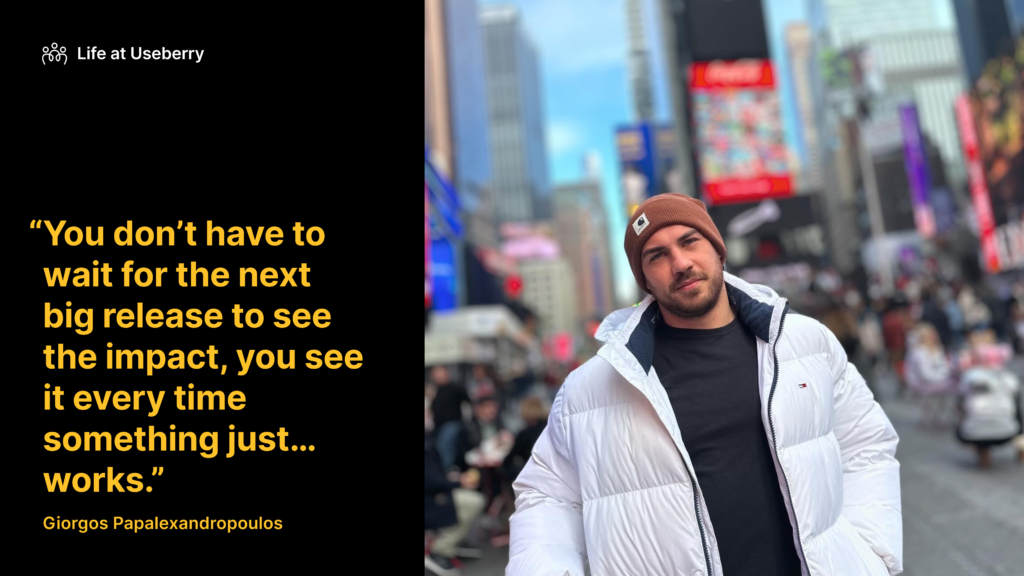On this edition of Life at Useberry, we have a few new members to highlight that brought a wave of fresh energy to Useberry. From frontend finesse to backend wizardry and devops magic, the newest members of our team have jumped in with sharp skills, good vibes, and a whole lot of curiosity.
Time to introduce the folks who joined us since the beginning of last year. You’ll find out what they are working on, how they approach their craft, and a few things you wouldn’t guess from their job titles. Spoiler alert: RPG dice, ukuleles, and Olympiakos loyalty all make an appearance. Let’s meet the newest Berries:
Sarah Doghri
With more than a decade of experience in web development and a Computer Science degree from Harokopio University of Athens, Sarah has worn many hats! From freelancing to full-stack roles in e-commerce teams across Greece and the UK. Before joining Useberry, she spent five years at a leading CRO agency in the UK, designing and developing for global clients as well as running the A/B testing efforts. Now, she brings that rich, diverse background to Useberry as a Frontend Engineer, where she’s focused on refactoring components for better performance and building shiny new features.
Her development process is refreshingly straightforward(her words, not mine!): understand the UX and design goals, build something, test it, break it, fix it, and keep iterating until it’s smooth. Off the clock, Sarah’s into arts, theatre, cartoons, horror movies, music, and occasionally surviving chaotic board game and RPG sessions (waiting for my invitation still..). When she is not perfecting components for Useberry, she works on developing the perfect game night chaos.

You’ve been working on both refactoring and building new features lately. What’s been one challenge that you’ve really enjoyed solving?
When I first joined Useberry, I jumped right into the refactoring process. It was a great way to get familiar with the app, while also looking for opportunities to optimize both the codebase and documentation, so it felt like a 2-in-1 win. Not long after, I got to build my first feature entirely from scratch, which was a super satisfying milestone. And -no spoilers- but there’s an upcoming feature I’ll be working on that I’m genuinely excited about! It’s shaping up to be one of the most challenging and interesting projects I’ve worked on in a while, involving the latest technologies and a strong focus on improving the UX.
With your background in A/B testing, how do you think experimentation fits into the developer’s workflow?
I see experimentation as a natural extension of a developer’s workflow, especially when working on user-facing features. Our role isn’t just about building a UI that looks good or functions correctly, but also about validating that it’s actually improving user experience or business metrics. Similarly, when a new design is being considered, it’s incredibly valuable to test its impact before investing time and effort into full implementation. Experimentation helps ensure that what we are building will actually benefit the project, rather than rely on assumptions.
What’s something about frontend development that you think is often misunderstood?
One thing that is often misunderstood about frontend development is how much it goes beyond just “making things look good” or “changing colors and moving things around”. It is sometimes seen as purely visual or cosmetic work, but in reality it’s deeply tied to performance, accessibility, usability and overall business impact.
For example, something as small as how fast a button renders, or its position, color or how it responds to interaction, can have a measurable effect on user behavior. A developer can tweak placement or timing of an animation and suddenly conversion rates shift! When combined with A/B testing and data analysis, that’s not just aesthetics, it’s behavioral design in action.
What’s been the biggest difference in your day-to-day since joining the Useberry team? Anything that surprised you?
The biggest difference in my day-to-day has been the mindset and energy of the people around me. Working with professionals who actively push their limits, strive to grow and genuinely value user feedback, that’s incredibly refreshing! It creates an environment where improvement feels natural & continuous, not forced. This kind of mindset is rare and it makes for a truly inspiring team dynamic. And when I end the day feeling satisfied with our work instead of the pressure cooker stress, that’s when I know I’m in the right place.
Useberry is a fast-paced workplace, but also a flexible one. How do you usually balance your focus time with everything else going on?
Putting my headphones on, that’s when it’s focus time for me. I really value collaboration and love being part of the brainstorming process, sharing ideas and working closely with the team. But having the flexibility to tune into my own rhythm and have some quiet time when needed in my own space, that is just as important. That balance between dynamic teamwork and focused individual work, is what helps me stay productive in a fast-paced environment. When it’s time to zone in and code, I appreciate that I can carve out quiet time to focus. The culture supports both modes really well.
Between music, theatre, cartoons, and RPG chaos, what’s your ultimate way to unwind after a long coding sprint?
That’s easy! Dance parties with my daughter. Guaranteed mood-booster.
Manolis Orfanos
Manolis joins Useberry with a strong academic background (Bachelor’s in Informatics and a Master’s in Advanced Computer Science) and over a decade of hands-on experience across logistics, retail, agriculture, and cybersecurity sectors. Most recently, he was a Tech Lead at HackTheBox, and now he’s working behind the scenes at Useberry to reimagine our backend infrastructure.
His current mission: create a cleaner, scalable API, redesign the database, and carry out the migration without flipping any metaphorical tables(real tables might have been flipped from time to time). He’s methodical, test-obsessed, and seriously good at house-cleaning when it comes to databases.
Outside of work, he splits his loyalty between Olympiakos and his cat Giakoumis(team cat all the way!). He’s also into martial arts, workouts, travel, video games, and playing his ukulele (we’re still waiting on the first office performance).

You’ve been deep into cleaning up and reworking our backend systems. What’s one part of the Useberry backend you’re most proud of improving?
Getting Symfony integrated was a big win. It laid the groundwork for transitioning away from the legacy code without breaking everything in the process. The trickiest part was keeping the system stable while introducing something entirely new, like upgrading the engine while the car is still running. But now we have a more extendable and developer-friendly setup, which makes life easier for everyone.
What’s your philosophy when it comes to database design and refactoring. Do you follow strict rules or go by instinct?
In order to design the database you need to understand the features you have and the business logic. Understand the project, identify the features and the entities involved and prepare to break everything down to its simplest form. Only then you are ready to design a correct and maintainable database.
You’ve been at Useberry for a while now. What’s one thing you appreciate about how the team works together?
Teamwork! Everyone shows up to help. All the developers are eager to help however they can no matter their experience. That kind of openness makes things run faster, and it keeps the quality high too. Plus, it just makes work more enjoyable.
Between Giakoumis, workouts, and your ukulele, how do you keep your work and life from tripping over each other? Oh it’s tripping… Workouts are easy, I just leave the house and do my thing. When I’m home Giakoumis needs to play, if he is not satisfied he warns me with a “Meow”, if I don’t give in he sends another reminder, if I fail to comply then biting starts and it WILL escalate quickly. Ukulele is something he likes though, he sits by me and pretends to like what I play. He is not a tough critic.
If Giakoumis could be assigned one developer task for the day, what would you trust him to handle?
Chasing bugs. He has already trained himself to attack!
Giorgos Papalexandropoulos
His process is all about figuring out what’s needed, researching similar tools or solutions, and building something efficient and repeatable. When he’s not automating infrastructure like a pro, you can find him training with weights during the week, traveling(starting to see a pattern here), or reading up on economics.
George-Pap came to Useberry with a background in software development and system administration, having worked at Citrix and Thales before stepping into his current DevOps role. With a Master’s in Intelligent Information and Communication Systems, he’s helping the team deploy, build, and test faster through automation.

DevOps can be one of the most invisible yet impactful roles on a team. What’s something you wish more people understood about what you do?
The nature of this role is to help both the team and the company, not to make anyone’s life harder. The point is to remove friction, not create it. My job is to make sure everything runs smoother behind the scenes so I it is a regular iterations of builds, tests, deployments, and constant monitoring. You don’t have to wait for the next big release to see the impact. You see it every time something just… works. The work is often behind the scenes, but it continuously supports the entire development lifecycle.
You’ve worked in system administration and software development. How do those backgrounds come together in your DevOps work at Useberry?
DevOps isn’t just a standalone role, you need a solid understanding of both development and operations to bridge the gap between them. The goal is to make things easier, faster and safer for both sides. My background gave me the foundations needed to connect the two effectively.
As someone who helps others deploy and test faster, what’s been your experience collaborating with the rest of the Useberry team so far?
Everyone at Useberry understands the importance of taking steps toward a more robust and reliable application, which makes collaboration much smoother. People are quick to adapt and not overly attached to the “old way” of doing things. When a team is open to change and willing to adapt, it is easy to deploy and test faster. We are all working to make the platform better, and everyone seems to get that.
Is there anything about the work culture at Useberry that helps you stay productive without burning out?
Yes, the team is incredibly supportive and easy to reach. Whenever I need help, someone is always there to step in. That kind of collaborative environment really helps me stay productive without feeling overwhelmed.
From weights to reading about the economy, you seem to enjoy systems of all kinds. Does that mindset influence how you approach your role?
Yes, one of the most important things is the ability to adapt. Different times call for different solutions, so it’s essential to learn, apply and evolve with new technologies. You don’t need to be an expert in everything, you just need to be willing to read explore and grow in areas you are not familiar with yet.
What’s one repetitive task in daily life that you wish you could automate?
There are a lot of things I think we all wish to automate in our daily life but House chores are on top of the list. Laundry, ironing, vacuuming… That’s why getting a robot vacuum is number one on my best purchases list for the year so far. Still waiting for someone to invent a dish-putting-back-in-the-cupboard bot.
Conclusion
So there you have it! A peek into the minds, offices and even living rooms of some of the newest Berries on the block. From debugging databases with cat sidekicks to frontend feature builds powered by late-night RPG energy, this crew brought their A-game from day one. It’s been fun getting to know them a little better, and we hope you enjoyed it too. If you ever spot one of them in the wild, you know who is your go to for a game night or who to ask for a ukulele solo. We will be back with more from the team again next time!
We are always open for exceptional talent!
If you would like to join us, send us your cv at contact@useberry.com




